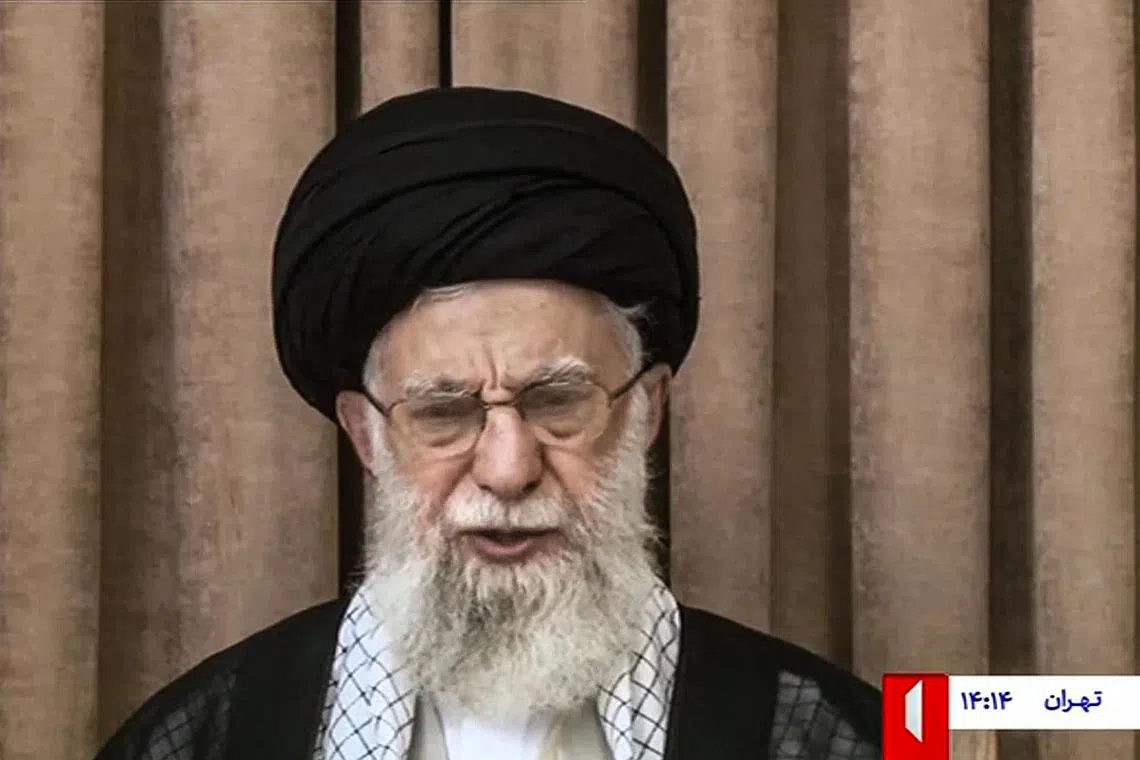Iran’s Khamenei says Trump ‘exaggerated’ impact of US strikes on nuclear sites
Sign up now: Get ST's newsletters delivered to your inbox

Iran’s supreme leader Ayatollah Ali Khamenei addressing the nation on June 26.
PHOTO: AFP
TEHRAN - Iran’s Supreme Leader, Ayatollah Ali Khamenei, on June 26 said US President Donald Trump “exaggerated” the impact of US strikes on Iranian nuclear sites, in his first appearance since a ceasefire in the war with Israel took hold.
In a statement and a televised speech carried by state media, he hailed his country’s “victory” over Israel and vowed never to surrender to the US, while claiming that Washington had been dealt a “slap” after striking Iranian nuclear sites.
Mr Khamenei’s remarks come two days after a ceasefire ended a 12-day war
It also follows a stinging row in the US over the actual extent of the damage inflicted by American strikes on key Iranian nuclear sites during the conflict.
“The American President exaggerated events in unusual ways, and it turned out that he needed this exaggeration,” Mr Khamenei said.
The US “has gained nothing from this war”, he said, adding that American strikes “did nothing significant” to Iran’s nuclear facilities.
“The Islamic republic won, and in retaliation dealt a severe slap to the face of America,” he said, a reference to Iran’s missile launch targeting the largest US base in the Middle East.
“I want to congratulate the great Iranian nation... for its victory over the fallacious Zionist regime,” he added, saying that Israel had “almost collapsed” because of Iran’s strikes.
Both Iran and Israel have claimed they emerged victorious, with Israeli Prime Minister Benjamin Netanyahu hailing on June 24 a “historic victory”
US defence
In the US, leaked intelligence this week opened up a Pandora’s box of accusations and counter-claims over the extent of the damage caused by the strikes.
After waves of Israeli attacks on nuclear and military sites and retaliatory missile fire from Iran since June 13, the US bombed three key Iranian atomic facilities
An initial classified assessment, first reported by CNN, was said to have concluded that the strikes did not destroy key components and that Iran’s nuclear programme was set back only months at most.
Another key question raised by experts is whether Iran, preparing for the strike, moved out some 400kg of enriched uranium – which could now be hidden elsewhere in the vast country.
The US administration has hit back furiously, with Mr Trump saying the attack “obliterated” Iran’s nuclear facilities, including the key site of Fordow
At a press conference on June 26, US Secretary of Defense Pete Hegseth said the initial assessment was low confidence, and, citing comments from Central Intelligence Agency (CIA) director John Ratcliffe, said it had been overtaken by intelligence showing Iran’s nuclear programme was severely damaged by the US strikes and would take years to rebuild.
The CIA chief said in a statement on June 25 that “several key Iranian nuclear facilities were destroyed and would have to be rebuilt over the course of years”.
Mr Hegseth added that he was unaware of any intelligence suggesting Iran had moved any of its highly enriched uranium to shield it from the strikes.
“I am not aware of any intelligence that I’ve reviewed that says things were not where they were supposed to be, moved or otherwise,” he said.
The Israeli military said it had delivered a “significant” blow to Iran’s nuclear sites but that it was “still early” to fully assess the damage.
Mr Netanyahu announced that “we have thwarted Iran’s nuclear project”.
“And if anyone in Iran tries to rebuild it, we will act with the same determination, with the same intensity, to foil any attempt,” he said.
Nuclear talks?
Iranian Foreign Ministry spokesman Esmaeil Baqaei told Al Jazeera that “nuclear installations have been badly damaged, that’s for sure”.
After the war derailed nuclear talks between Iran and the US, Mr Trump said Washington would hold discussions with Tehran
Mr Trump told reporters that Israel and Iran were “both tired, exhausted”, before going on to say that talks were planned with Iran next week.
“We may sign an agreement. I don’t know,” he added.
Iran has systematically denied seeking a nuclear weapon while defending its “legitimate rights” to the peaceful use of atomic energy.
It has also said it was willing to return to nuclear negotiations with Washington.
The Israeli strikes on Iran killed at least 627 civilians, Tehran’s Health Ministry said. Iran’s attacks on Israel killed 28 people, according to official figures.
A state funeral will be held on June 28 in Tehran for top commanders and nuclear scientists killed in the war


